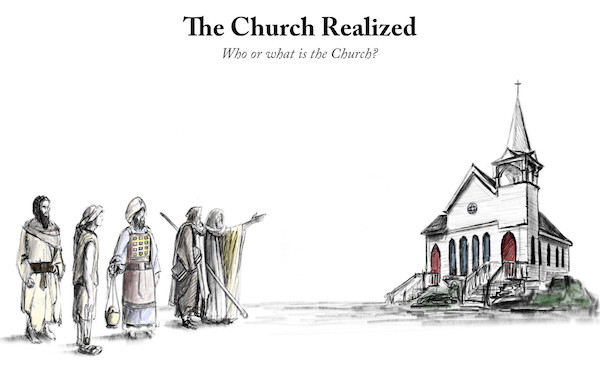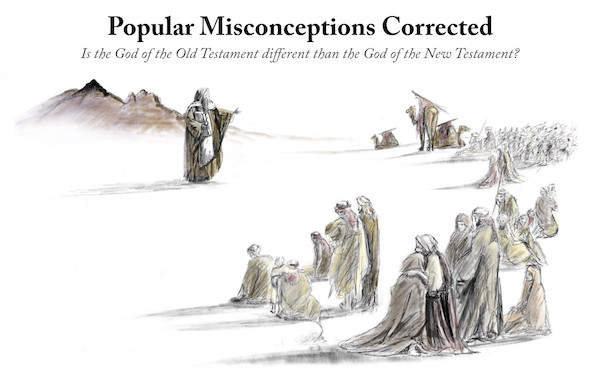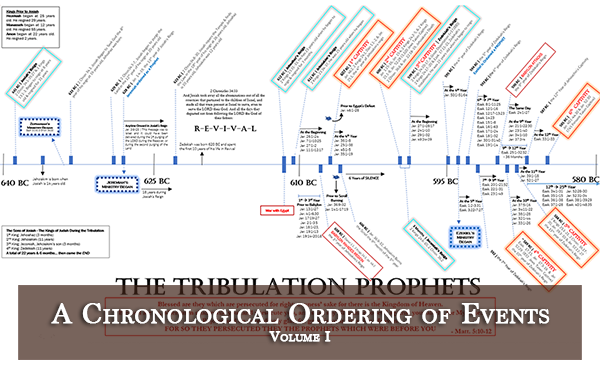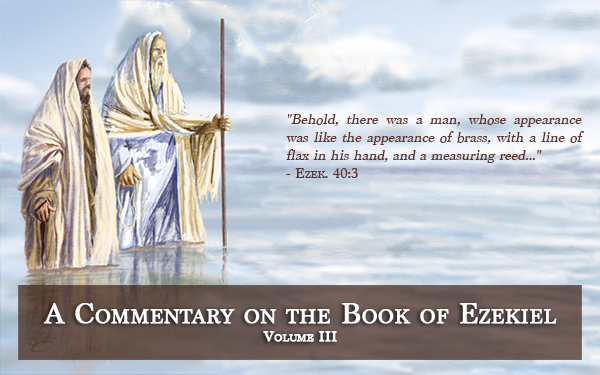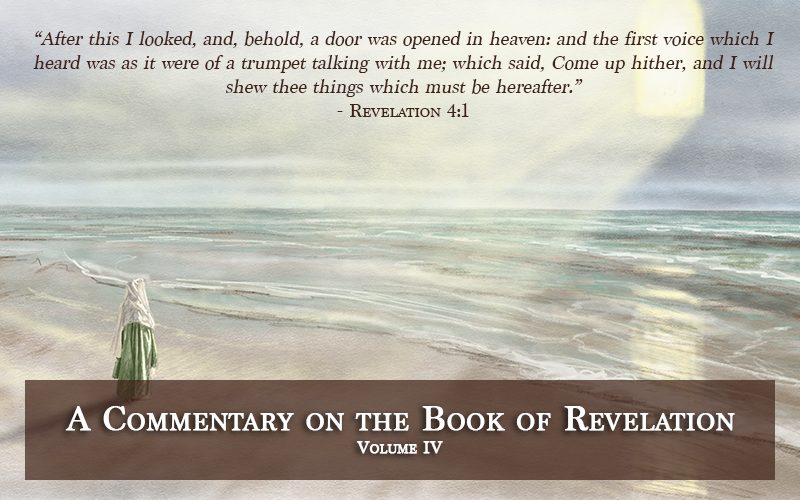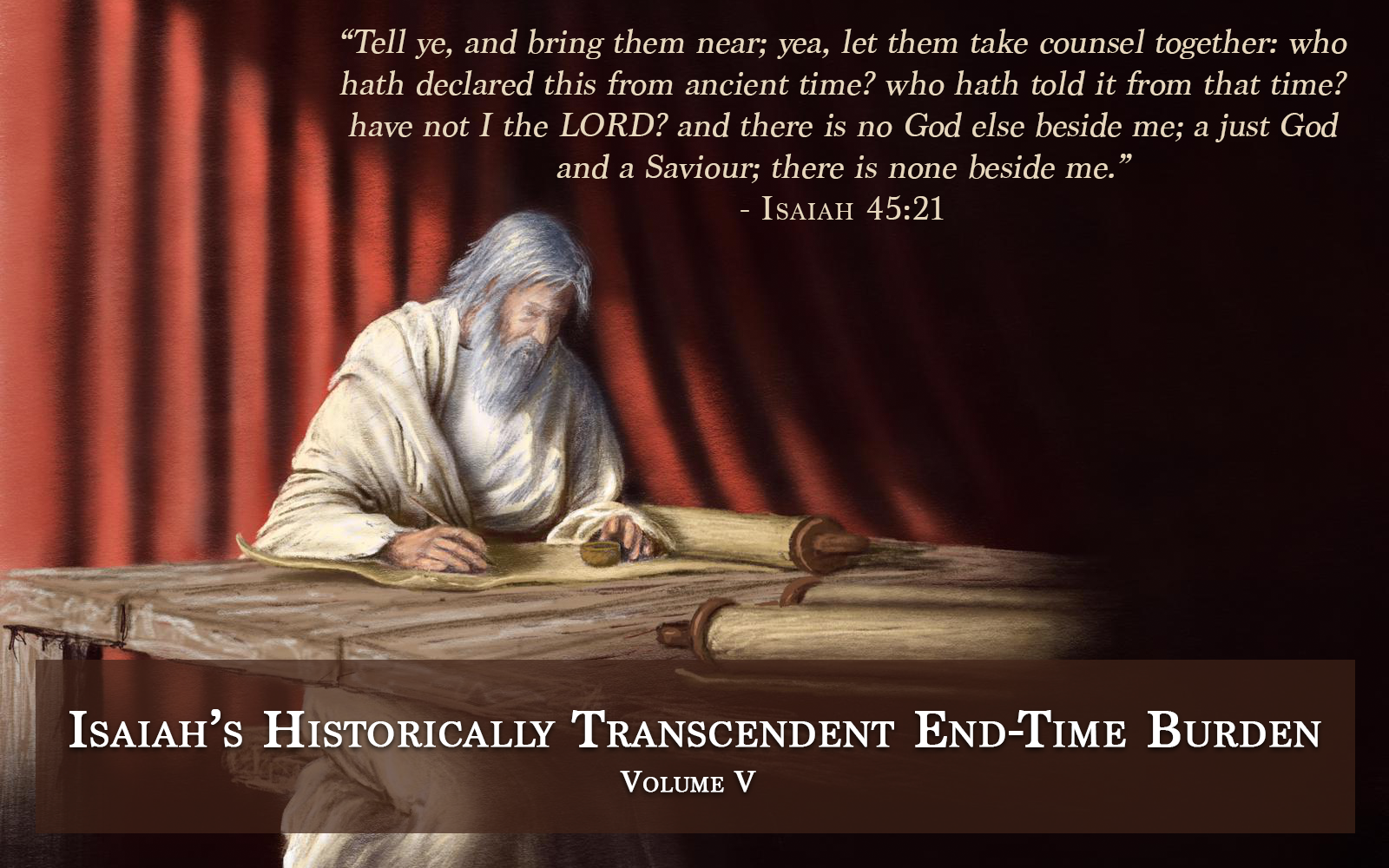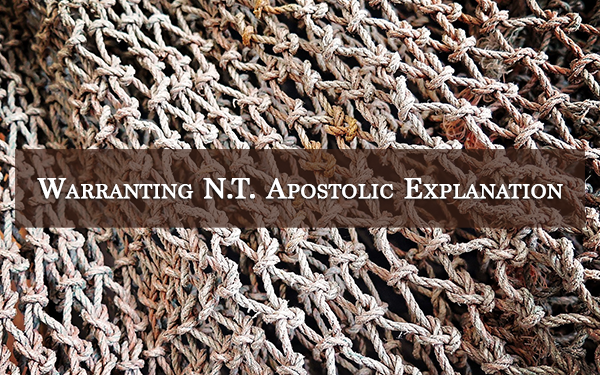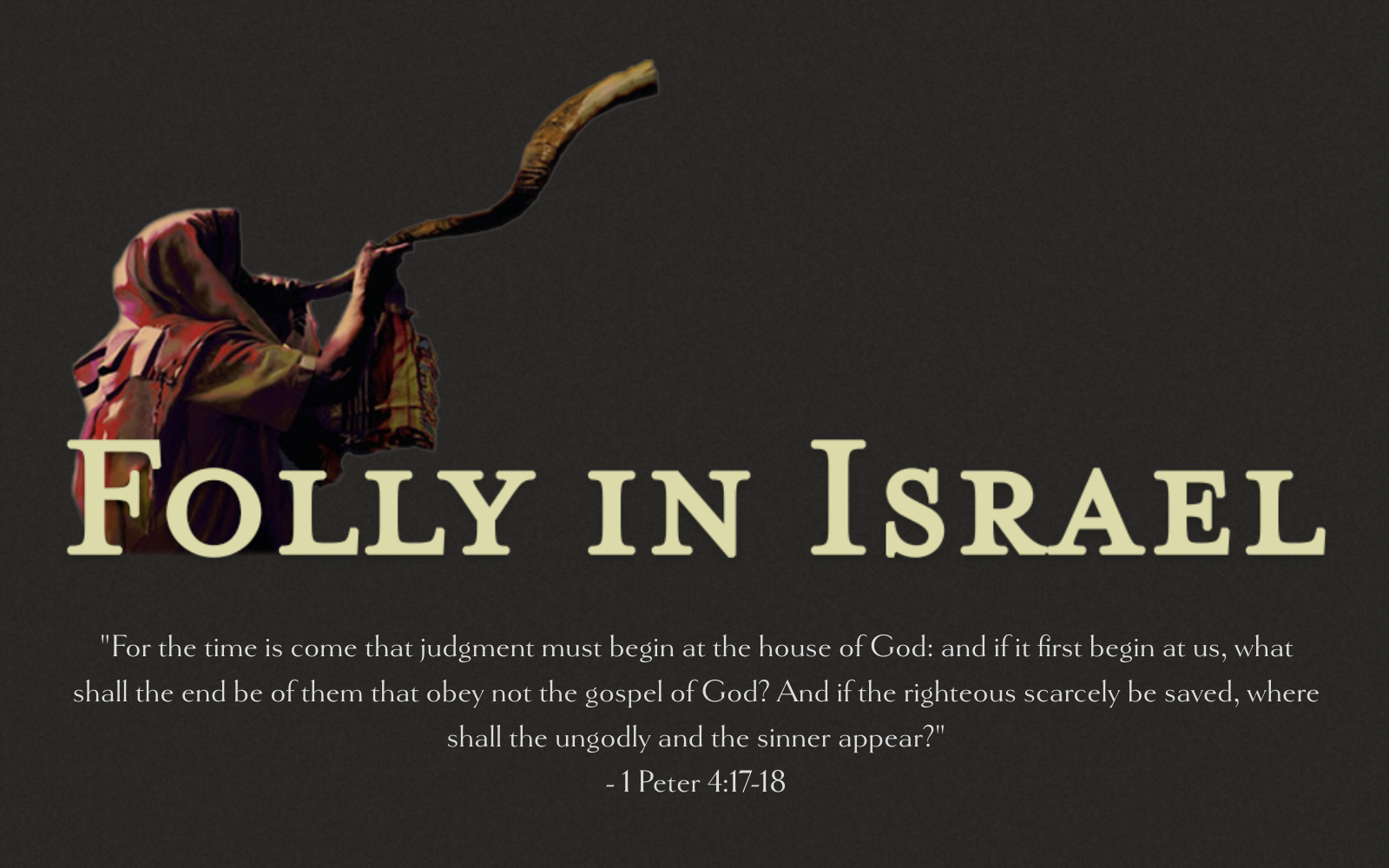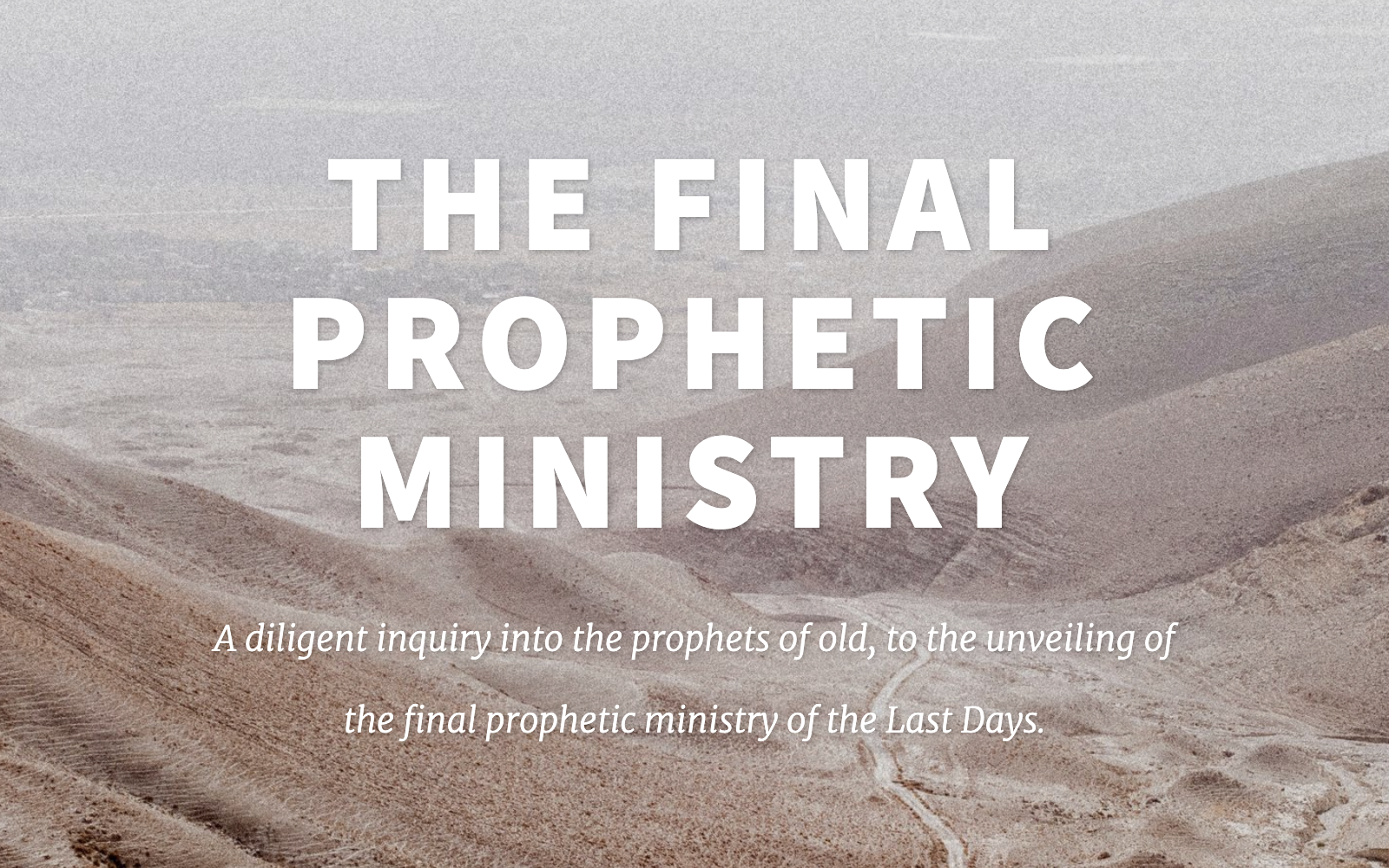Discerning A True Or False Prophecy
CAN GOD CHANGE HIS MIND?
- The Rules of Prophecy -
Upon the mention of “prophecy” in any generation beyond the 1st century, the skills of popular discernment among professing Christendom are very simple. For example, when most people hear that so and so has “prophesied”, the passage of scripture which comes to mind is, most commonly, Deuteronomy 18:21-22. “Did the prophecy come to pass”, they ask… and that settles it. To most, no more information is needed to discern a true prophecy from a false prophecy, a true prophet from a false prophet, as seems apparent by the aforementioned scripture:
|
“And if thou say in thine heart, How shall we know the word which the LORD hath not spoken? When a prophet speaketh in the name of the LORD, if the thing follow not, nor come to pass, that is the thing which the LORD hath not spoken, but the prophet hath spoken it presumptuously: thou shalt not be afraid of him.” – Deut. 18:21-22
|
The quest for discernment of true and false prophets appears to be introduced and answered in just two verses, but is this all the instruction which the scripture has to offer on the subject of discerning prophets? Most people are ready to disclaim and denounce any so called “prophet” when and if anything they have said in the Name of the Lord fails to “come to pass”, no more questions asked. Are they right? Isn’t this what Deuteronomy 18:21-22 is clearly teaching?
My reader, we have need of sober reflection on such a simplistic engagement of “discernment”. If we were to engage in the holy exercise of discerning true and false prophets wholly based upon this one principle, we would conclude that…
My reader, we have need of sober reflection on such a simplistic engagement of “discernment”. If we were to engage in the holy exercise of discerning true and false prophets wholly based upon this one principle, we would conclude that…
|
Jonah is a false prophet – Jonah 3:4, 10 (after 40 days Nineveh was not destroyed; More Information)
Isaiah is a false prophet – Isaiah 38:1, 38:5 (Hezekiah did not die; More Information) Moses is a false prophet – Ex. 29:9, 40:15, 1 Sam. 2:35, 1 Kings 2:27 (Eli’s family priesthood was not perpetual, everlasting, and forever; More Information) Jeremiah is a false prophet – Jer. 15:15-21 (Jeremiah was not carried away into the captivity of Babylon; More Information) |
The above prophecies did truthfully foretell an actual event by the word of the LORD, and yet… the event did not come to pass! Thus, according to the overemphasized and popularized RULE of prophecy, Deuteronomy 18:21-22, these men should be considered false prophets… but they’re not! Why? The things which these prophets spoke in the name of the LORD did not “follow” or “come to pass” (Deut. 18:22), this is true, but these men did not commit the crime of speaking “presumptuously” because the Lord DID actually speak what the prophets uttered (Deut. 18:22)! The prophecy did not come to pass and yet the Lord was the One who spoke the word, my reader, therefore the prophet did not commit the crime called, “presumptuous prophesying”. Furthermore, if a prophet did speak in the name of the LORD and the prophecy did miraculously come to pass, this man can still be a false prophet who has spoken “presumptuously” because the Lord DID NOT speak to him (according to Deut. 13:1-4)! The fact that a prophecy does or does not come to pass cannot and must not be the sole indicator by which he is verified or denounced as a true or false prophet, according to the common interpretation of Deuteronomy 18:21-22.
This being the case, apparently The Rules of Prophecy are not as simplistic as the 21st century “Prophet Debunkers” have made things out to be! Something is wrong with the angry, simplistic, no-further-questions-necessary DENOUNCERS of prophets and prophecies based upon this one Rule they suppose is a sole indication of authenticity. Something is wrong with the popularized interpretation and practice of “discernment” that men advocate based upon Deuteronomy 18:21-22. All this being said, what can we say about Deuteronomy 18:21-22… what does it actually mean? How should it be correctly interpreted? And what are the other Rules of prophecy – the whole scope of them! – whereby we might understand how prophecy works?
What is the correct interpretation of Deuteronomy 18:21-22?
The Rule of discernment provided to test a prophet, written in Deuteronomy 18:21-22, is context-sensitive to a particular Prophet, not just any prophet. With the entire context of the passage in view, stretching from Deuteronomy chapter 18 verse 15 to verse 22, we can see that theTesting Rules are case-specific to the coming of a very special prophet, The Prophet like unto Moses, mentioned in verse 15. Moses specified, “The LORD thy God will raise up unto thee a Prophet from the midst of thee, and of thy brethren, like unto me; unto Him ye shall hearken” (Deut. 18:15). God Almighty did also specify the coming of this Prophet when speaking to Moses, saying,
This being the case, apparently The Rules of Prophecy are not as simplistic as the 21st century “Prophet Debunkers” have made things out to be! Something is wrong with the angry, simplistic, no-further-questions-necessary DENOUNCERS of prophets and prophecies based upon this one Rule they suppose is a sole indication of authenticity. Something is wrong with the popularized interpretation and practice of “discernment” that men advocate based upon Deuteronomy 18:21-22. All this being said, what can we say about Deuteronomy 18:21-22… what does it actually mean? How should it be correctly interpreted? And what are the other Rules of prophecy – the whole scope of them! – whereby we might understand how prophecy works?
What is the correct interpretation of Deuteronomy 18:21-22?
The Rule of discernment provided to test a prophet, written in Deuteronomy 18:21-22, is context-sensitive to a particular Prophet, not just any prophet. With the entire context of the passage in view, stretching from Deuteronomy chapter 18 verse 15 to verse 22, we can see that theTesting Rules are case-specific to the coming of a very special prophet, The Prophet like unto Moses, mentioned in verse 15. Moses specified, “The LORD thy God will raise up unto thee a Prophet from the midst of thee, and of thy brethren, like unto me; unto Him ye shall hearken” (Deut. 18:15). God Almighty did also specify the coming of this Prophet when speaking to Moses, saying,
|
“I will raise them up a Prophet from among their brethren, like unto thee, and will put My words in His mouth; and He shall speak unto them all that I shall command Him. And it shall come to pass, that whosoever will not hearken unto My words which He shall speak in My name, I will require it of him.” – Deut. 18:18-19
|
The contextual foreground of the Prophetic Testing Rule provided in Deuteronomy 18:20-22 isolates the prophets who are to be determined as false based upon this one Rule; they are not just any prophets, they are prophets who claim to be sent by God to prophesy as “The Prophet like unto Moses”. God has provided a very special test for all those who claim to prophesy as this very special Prophet.
This Prophet, “The Prophet like unto Moses”, will walk in a mantle like no other prophet’s calling (Deut. 34:9-12, Num. 12:6-8, Heb. 1:1-4,3:5-6) because of the magnitude of God’s glory and nearness the Prophet will experience (Deut. 34:10, Num. 12:6-8, Jn. 1:18), because of all the signs and wonders which shall be accomplished (Deut. 34:11-12, Jn. 21:25, Heb. 2:3-4) for the establishment of a Covenant wherein the Prophet acts in a mediatory and intercessory Office (Ex. 20:18-21, Deut. 4:9-13, 23-24, 5:1-33, 18:16-17, Ps. 106:23, Heb. 7:22, 8:1-7), and all who will refuse to hear and obey this Prophet will be destroyed from among the people of God with a comparable and greater severity than what has been executed upon the rebels of Moses’ day (Deut. 18:19, Acts 3:23; note: for a comparison of the severity used between refusers of Moses’ and Jesus’ Covenant, see Heb. 2:1-4, 3:14-4:2, 10:28-29, 12:18-29, 1 Cor. 10:1-12). Therefore, because the status and title of this Prophet are exclusive, the Rule of testing is exclusive; because the status and title of this Prophet are singular, the Rule of testing is singular. Because the scope of this Prophet’s prophesying will be so vast and significant that it is comparable to the ministry of Moses, meaning – a New Covenant will be established, like the Old Covenant, via another Covenanting Mountain called Mount Zion, like Mount Sinai (Heb. 12:18-24) – therefore, necessarily, if this Prophet’s prophesying does not come to pass we can be sure that he is a false prophet! [For more information, please see "Tracing Hebrews", "Holy Mount Sinai", "The Call, Mount, and Fear of the Prophet like unto Moses - Jesus Christ", "Zion is the Mountain of our Covenant".]
Ah! But how we have erred, beloved brethren! How many have used this Rule to angrily denounce modern day prophets and their prophecies (however rare they may be!), prophets who have not claimed the inspirational scope, title, and ministry exclusively owned by “The Prophet like unto Moses”!? This simplistic and sinful no-further-questions-asked denouncement should be halted, my reader. We should, rather, pursue a biblical education of all The Rules of Prophecy, shouldn't we? Meanwhile, all of Jesus’ prophesying of the Covenant, Mountain, and Ministry which pertained to Himself DID come to pass, and will; thus we should be afraid of this Prophet and follow Him above Moses and Elijah – God saying, “HEAR YE HIM” (2 Pet. 1:16-19, Matt. 17:1-7, John 3:31, Heb. 12:26-29)! The Voice of God from the excellent glory did, with all other necessary tokens, set-apart Jesus Christ as The Prophet like Unto Moses... and it was and is unchangeably so (Ps. 110:4,Heb. 7:1-3, 17), hallelujah!
Based upon Deuteronomy 18:15-22, the prophetic content of this Prophet, Jesus Christ, whose scope of prophecy was reformational and Covenant-changing, must not and cannot be changed! This means that God will not repent of the title or Office of this Prophet, nor will God send Him to the earth via The Incarnation so that, suddenly, the content or purpose of His predestinated ministry would be thwarted by the sin of man and, as a consequence, cause a repentance to transpire in the heart of God which will, therefore, alter the course of this Prophet's ministry, purpose, or spoken word so that, alas, one or some of His goodly and Covenant-changing words would not come to pass. God forbid! My reader, there will never be any other Covenant made by another reformational Prophet yet to arise, nor were the accompanying signs which verified this Prophet’s authenticity enabled to slumber, therefore when and if anyone arose to prophesy and was falsely claiming this title and mantle, God would make sure his prophesying would fall to the ground in utter humiliation! Established for this Prophet is a single test for a content-specific purpose reserved for the determination of a single Person.
This Prophet, “The Prophet like unto Moses”, will walk in a mantle like no other prophet’s calling (Deut. 34:9-12, Num. 12:6-8, Heb. 1:1-4,3:5-6) because of the magnitude of God’s glory and nearness the Prophet will experience (Deut. 34:10, Num. 12:6-8, Jn. 1:18), because of all the signs and wonders which shall be accomplished (Deut. 34:11-12, Jn. 21:25, Heb. 2:3-4) for the establishment of a Covenant wherein the Prophet acts in a mediatory and intercessory Office (Ex. 20:18-21, Deut. 4:9-13, 23-24, 5:1-33, 18:16-17, Ps. 106:23, Heb. 7:22, 8:1-7), and all who will refuse to hear and obey this Prophet will be destroyed from among the people of God with a comparable and greater severity than what has been executed upon the rebels of Moses’ day (Deut. 18:19, Acts 3:23; note: for a comparison of the severity used between refusers of Moses’ and Jesus’ Covenant, see Heb. 2:1-4, 3:14-4:2, 10:28-29, 12:18-29, 1 Cor. 10:1-12). Therefore, because the status and title of this Prophet are exclusive, the Rule of testing is exclusive; because the status and title of this Prophet are singular, the Rule of testing is singular. Because the scope of this Prophet’s prophesying will be so vast and significant that it is comparable to the ministry of Moses, meaning – a New Covenant will be established, like the Old Covenant, via another Covenanting Mountain called Mount Zion, like Mount Sinai (Heb. 12:18-24) – therefore, necessarily, if this Prophet’s prophesying does not come to pass we can be sure that he is a false prophet! [For more information, please see "Tracing Hebrews", "Holy Mount Sinai", "The Call, Mount, and Fear of the Prophet like unto Moses - Jesus Christ", "Zion is the Mountain of our Covenant".]
Ah! But how we have erred, beloved brethren! How many have used this Rule to angrily denounce modern day prophets and their prophecies (however rare they may be!), prophets who have not claimed the inspirational scope, title, and ministry exclusively owned by “The Prophet like unto Moses”!? This simplistic and sinful no-further-questions-asked denouncement should be halted, my reader. We should, rather, pursue a biblical education of all The Rules of Prophecy, shouldn't we? Meanwhile, all of Jesus’ prophesying of the Covenant, Mountain, and Ministry which pertained to Himself DID come to pass, and will; thus we should be afraid of this Prophet and follow Him above Moses and Elijah – God saying, “HEAR YE HIM” (2 Pet. 1:16-19, Matt. 17:1-7, John 3:31, Heb. 12:26-29)! The Voice of God from the excellent glory did, with all other necessary tokens, set-apart Jesus Christ as The Prophet like Unto Moses... and it was and is unchangeably so (Ps. 110:4,Heb. 7:1-3, 17), hallelujah!
Based upon Deuteronomy 18:15-22, the prophetic content of this Prophet, Jesus Christ, whose scope of prophecy was reformational and Covenant-changing, must not and cannot be changed! This means that God will not repent of the title or Office of this Prophet, nor will God send Him to the earth via The Incarnation so that, suddenly, the content or purpose of His predestinated ministry would be thwarted by the sin of man and, as a consequence, cause a repentance to transpire in the heart of God which will, therefore, alter the course of this Prophet's ministry, purpose, or spoken word so that, alas, one or some of His goodly and Covenant-changing words would not come to pass. God forbid! My reader, there will never be any other Covenant made by another reformational Prophet yet to arise, nor were the accompanying signs which verified this Prophet’s authenticity enabled to slumber, therefore when and if anyone arose to prophesy and was falsely claiming this title and mantle, God would make sure his prophesying would fall to the ground in utter humiliation! Established for this Prophet is a single test for a content-specific purpose reserved for the determination of a single Person.
What are the other Rules of Prophecy whereby we might understand how prophecy works?
How is it possible that, in the cases of Jonah, Isaiah, Moses, & Jeremiah, their prophesying did not come to pass?
How is it possible that, in the cases of Jonah, Isaiah, Moses, & Jeremiah, their prophesying did not come to pass?
At the aftermath of Jonah’s prophecy, it was written, “And God saw their works, that they turned from their evil way; and God repented of the evil, that He had said that He would do unto them; and He did it not” (Jonah 3:10). Jonah confessed how he knew that repentance was a capability possessed by God and often used, saying, “I knew that Thou art a gracious God, and merciful, slow to anger, and of great kindness, and repentest Thee of the evil” (Jonah 4:2). As it happened with Jonah’s prophecy against the Ninevites, so it happened with Isaiah’s prophecy against Hezekiah, Moses’s prophecy unto the Aaronic Priesthood (the sons of Aaron), and Jeremiah’s prophecy (of God’s word) unto himself… God repented. God changed His mind and went back on the word which He spoke. Did you know that this was possible, dear Calvinist? God Almighty further confirms this condescended relationship He has undertaken toward man, saying,
|
“At what instant I shall speak concerning a nation, and concerning a kingdom, to pluck up, and to pull down, and to destroy it; IF that nation, against whom I have pronounced, turn from their evil, I will repent of the evil that I thought to do unto them. And at what instant I shall speak concerning a nation, and concerning a kingdom, to build and to plant it; If it do evil in my sight, that it obey not My voice, then I will repent of the good, wherewith I said I would benefit them. Now therefore go to, speak to the men of Judah, and to the inhabitants of Jerusalem, saying, Thus saith the LORD; Behold, I frame evil against you, and devise a device against you: return ye now every one from his evil way, and make your ways and your doings good.” –Jeremiah 18:7-11
|
God said He can and does repent of his thoughts and words based upon the changeable, reactionary, and responsive thoughts, words, and deeds of His people when they hear the word of the LORD. Whether this be a prophetically revealed purpose of damnation or salvation (physical or spiritual, temporary or eternal), the LORD said, “I will repent”, based upon how the people respond. For Calvinists, it is startling to discover that the sovereign, dignified, and eternal Godhead can change at all – whether in thought and desire or in words of prophecy – specifically because they conclude that God cannot change, and rightly so, as it was written, “I am the LORD, I change not” (Mal. 3:6). The changelessness of God Almighty is inherently joined together with the essence of His Divinity, that He is Omnipresent, Omnipotent, and Omniscient, therefore how can He change? It is impossible! Confirming this, it was written,
|
“God is not a man, that He should lie; neither the son of man, that He should repent: hath He said, and shall He not do it? or hath He spoken, and shall He not make it good?” – Num. 23:19
"And also the Strength of Israel will not lie nor repent: for He is not a man, that He should repent." – 1 Sam. 15:29 “For as the heavens are higher than the earth, so are My ways higher than your ways, and My thoughts than your thoughts.” –Isaiah 55:9 |
The LORD is Omnipresent, Omnipotent, and Omniscient, therefore God’s ways – His thoughts and words – must also be changeless, without repentance, and void of alteration, right? Changeableness is consistent with man’s ways – man’s thoughts and words – and because “God is not a man” (Num. 23:19) then He certainly cannot change, repent, or alter the word which He has spoken, right? All of this is true if, and only IF, God never relates to mankind in ulterior ways which are infinitely condescending to us, feeble man, so that the LORD disrobes Himself from God’s ways so as to think and speak to us in man’s ways – God in the Ways of Man. This would be an infinite condescension indeed, but is it real?
How else can we explain or understand the biblical fact that God does repent and
alter His spoken word scores of times throughout biblical history?
alter His spoken word scores of times throughout biblical history?
A detailed study will prove that God does disrobe Himself from Omnipresence, Omnipotence, and Omniscience so as to have a relationship with us, feeble man. This would mean that the LORD does relationally diminish the glory of what could be called, “God in the Ways of God”, because of the irreconcilable inconceivableness of it, because of the un-relatable-ness of it, because mere man can neither comprehend it nor endure it; thus God relates to us by a condescended means which are relatable and understandable to us, called, “God in the Ways of Man”. Albeit, my reader, simply because God does indeed repent and alter His spoken word in a condescended relationship to mankind, this does not mean that His unrepentant and unalterable counsels cease to exist. God exists in “God in the Ways of God” and “God in the Ways of Man”, at the same time. The LORD’s desires exist in two wills (two relational capacities), not just one; and both wills are genuine and authentic. There are simultaneous and genuine wills existing in GOD which are interacting with and complementing one another during all the events and happenings of time and space. These simultaneous wills are evident in the prophesying of true prophets as seen in lesser matters, weightier matters, priestly covenants, kingly covenants, and, furthermore, the Abrahamic Covenant and the Davidic Covenant. Aye, my reader! Consider the loft and height of God's incomprehensible Person, how that He is capable of conscious realities we cannot even fathom, therefore in the lowness of our persons let us look up, learn, and trust whatever the Book says!
Take note, my reader, in the aforementioned hyperlinks The Rules of Prophecy are laid forth for our observance. If a spoken prophecy does not come to pass, or if it partially instead of fully comes to pass (it being changed or altered in some way), this does not mean that the prophecy spoken was not of God! As you can see (God willing) the evidence speaks for itself… otherwise, once again, Moses and Nathan are false prophets.
|
Moses is a false prophet - Ex.2:24, 3:8, 17, 12:25, 13:5, 11, Num. 14:30, 34 (the Exodus Generation was not brought into the Promised Land to inherit it; More Information)
Nathan is a false prophet – 1 Sam. 7:12-16 (Solomon’s earthly throne was not an unbreakable and enduring establishment generation to generation forever; More Information) |
Calvinists oversimplify the Godhead, disallowing the existence of a condescension to mankind in “God in the Ways of Man”. We must not interpret prophecy in our personal experience any different than prophecy was exemplified in the pages of biblical history, therefore prophecy is not changeless and inalterable. Most Calvinists have never even considered that God has the capability to repent, I know, but this is because their unbending meditations of God in His changeless, eternal, and sovereign glory have wrongly become the sole means of God-to-man relationship they are willing to acknowledge. At first thought, it is utterly inconceivable to a Calvinist that anything else could be possible in God, except changelessness. Nevertheless, I plead with you, my reader, God’s changelessness and full sovereignty do still exist! …only not in the simplistic fashion you have interpreted and applied.
God’s unrepentant purposes are manifested by outlasting and concluding all repentances, so that from thenceforth forever, there are no more repentances. It is the unrepentant purpose of God that governs all His intermittent repentances. As for literal and physical Israel, for example, they are elect through an unrepentant election (Rom. 11:28), “For the gifts and calling of God” toward them “all” (Rom. 11:26) “are without repentance” (Rom. 11:29), though throughout time the literal, physical, and spiritual Israelites, both individuals and generations, were damned through God’s repentances, until the persons of His unrepentant love are all saved and the generation of His unrepentant calling doth arise in the end of time. All the Covenants of salvation through the ages of time do testify to this… and can we be blind to it!?
Through the fall of the Exodus generation, the Abrahamic Covenant is pending until the work of Christ consummates and entirely fulfills it. Through the fall of Solomon, the Davidic Covenant is pending until the work of Christ consummates and entirely fulfills it. Through the fall of the Judaistic nation and people of God in the first century (at the first coming of Christ), the consummated promises of God for the full salvation of Israel is pending until the work of Christ consummates and entirely fulfills it, and temporarily through this fall the predestinated purpose to reconcile the whole (Gentile) world to Himself is manifest until the fulfillment of the Abrahamic and Davidic Covenants are accomplished wherein, conclusively, all of physical Israel will be saved, but it is at the end of time, after the fullness of the Gentiles comes in. Of what nature is this END? It is the resurrection, the condescension withdrawn, inaugurating the full reign of the Messianic King Jesus, who will fully recreate the laws of all creation, remove the curses of sin, and fully reconcile, resurrect, redeem, and save His partially regeneratedChristians who waited for Him on earth. On this Day, this glorious Day, the ancient saying shall be finally fulfilled at once and forevermore, "repentance shall be hid from Mine eyes" (Hos. 13:14), God said! - the abolition of repentances in God!
The unchangeable, everlasting mercy of God is enjoyed by all the elect, this is true. But how does one become assured that he is a part of “the elect”, to whom belongs this irresistible grace? Consider how God said, for example, "Mine heart is turned within Me, My repentings are kindled together" (Hos. 11:8). All the attributes of redemption which spring from “election” have one thing in common: they exist and are operated by an unrepentant purpose. In other words, the redemption of “the elect” is without repentance (without changes or alterations). I agree with this! But yet, because Calvinists nullify the condescension of God in the ways of man, they have an unbiblical definition of mercy (and the assurance thereof) that is enjoyed by the elect. The purposes of God that are without repentance are made discoverable by outlasting all repentances. The mercy of God that is elect, unchangeable, and everlasting (God in the Ways of God), is made discoverable by outlasting the wrath of God which compels sudden repentances of the purpose of mercy, and because this purpose of wrath was temporary, we can understand that the purpose of mercy was unchangeable and eternal, seeing that it was the final conclusion of the wrestle (Hos. 11:8). The words of God that are spoken by elect, unchangeable, and everlasting mercies (God in the ways of God), are made discoverable by outlasting the wrath of God which causes various alterations of God’s word and promise (alterations that He was constrained to utter during the duration in which He was angry) – and because God repented of these thoughts and words which were of wrath, anger, and damnation, we can understand that this repentance of wrath happened (within time, by a condescension, God in the ways of man) because of the purpose of God for mercy and redemption that was without repentance (God in the ways of God). All the purposes of God that are without repentancebecome manifest to us because they outlast the repentances of God! The un-repentant purposes of God (God in the ways of God) do govern and predestinate the course and final end of all the repentances of God (God in the ways of Man). All the mercy of God which is unchangeably elect and everlasting, becomes manifest to us by outlasting all the changes within God’s heart - from mercy to wrath and wrath to mercy, mercy to wrath and wrath to mercy. This is a biblical explanation of elect mercy as the scriptures teach it.
Calvinists do not believe that God can change His mind. This is because they are set to defend a singular vision of God’s existence: God in His sovereign and eternal attributes (i.e. God in the ways of God). This is a vision which is incomplete, lacking, and partial, because it omits the condescension of God in the ways of man. The Calvinists do unconsciously omit the plain teaching of scripture because they are so ambitious to defend the sovereignty of God, as they would understand it. They, being imprisoned by the presumption that all theology must be logicallyconsistent (according to our limited and all-too-often misguided human capacity), are compelled into a staunch rejection of all biblical teachings of scripture which are mysteriously paradoxical to God’s sovereignty. Oh, this pride! This blind obedience to human logic! Away with it! Calvinism makes men slaves to their logical capacity instead of God’s logical capacity; made evident by the unsearchable wisdom of scripture. The truth is: God coexists in a paradoxical way that is contrary to His sovereign, everlasting, and unchanging attributes. I call it, “God in the ways of man”, or, “The Condescension of God”. Yes simultaneously to this, God’s elect purposes are without repentance, this is true! I am not arguing the non-existence of absolute sovereignty as Calvinism would teach it, I am seeking to clarify how and in what way sovereignty and election are made discoverable by us and manifest in time, according to the scriptures and the potential happenings made possible by the condescension of God. Oh man, will you disagree? How will you ever be brought to confess the plain truth that God has purposed to do things which He did repent of? Will you be brought to confess that, indeed, according to scripture, God has altered what He thought and spoke many times!? To name a few, see Exodus 32:10, Num. 14:11-12, Num. 16:21-22, Num. 16:45, Ezek. 20:8-9, Ezek. 20:13-14, Ezek. 20:21-22, Deut. 32:26-27, Deut. 9:4-8. How did God purpose to do something and then repent of it, you wonder? Such a thing is contrary to God’s sovereign, eternal, and unchanging attributes, right? Indeed it is… and yet it happened. How?
My reader, this is made possible by “The Condescension of God”. And in this condescended relationship by which God relates to man, the intercession of Holy Spirit-inspired men compels God to change His purpose or spoken word (like as what is seen in Psalm 106:23). According to the examples I provided above via citation, we can see that God did, does, and will repent a multitude of times (even though He desires to destroy His people), and this is because His mercy is plenteous and rich! But when God is provoked TOO FAR the fury of His anger can reach the point of irreversibility, thus reprobation ensues (Jer. 15:6, Jer. 6:11). Elect mercies have been made discoverable to us when the sinfulness of God’s people did aggravate justice to mount up against them for an annihilating strike, only to be held back beyond all our comprehension of justice - which means that God granted them mercy and salvation “not according to [their] wicked ways, nor according to [their] corrupt doing” (Ezk. 20:44, 103:10, Rom. 9:15), even when their deeds were inciting damnation and destruction, according to the letter of justice written in Holy Scripture. This and this alone is how elect mercy is made discoverable by all (according to scripture)! And yet, how many people who believe in the sovereignty of God by election do also believe (contrary to scripture), that God cannot ever be angry with them again? How terrifying is this heresy! I testify to you my reader, that if elect saints like Jeremiah, Joshua, Jacob, David, Moses, Aaron, Hezekiah, and Josiah would have related to God only based upon His “everlasting love” and higher ways (God in the ways of God), they would be in hell right now [see The Damnable Abuse & Misapplication of Sovereign Election (chapter 14)]! I beg you to consider this testimony I have given to you before God and with a careful study of scripture (please, see that it is ordered and cited for you in the hyperlinked chapters provided). God help us to know the truth!
If this generation would study the vast amount of scripture which details how and in what way God’s sovereign and elect mercy is administered to man, and furthermore how it is made discoverable by man, the conclusions would be startling! Oh my reader, I ask you, what is merciful about the mercy of God? Let me exclaim it to you! Mercy restrained wrath so that not all of God’s saints were damned (because all DESERVED damnation)! Therefore it is an infinite wonder – the glory of MERCY – that any of God’s saints are saved at all! It is the glory of God’s elect mercy that most of the saints were destroyed by God’s near annihilating wrath, and not all, for God desired to, moved after, and uttered the sentence of total annihilation… but mercy restrained it! What is merciful about the mercy of God? It is that He “retaineth not His anger forever” (Mich. 7:18-19)… but Calvinists say it is that God is not angry at all, forever! These are opposite definitions! Which is it, my reader (see “The Near Annihilation of God’s People”, “I Am Weary With Repenting”, and “Mercy On Whom I Will Have Mercy”)? After a careful study you will find: elect mercy is manifest when God saves a remnant of His regenerate people from the total annihilation which they deserve, so that some instead of none are left alive and well! You see, God was endeavoring to totally annihilate His regenerated people, and yet He refrained Himself – sovereign mercy being the cause (Exodus 32:10, Num. 14:11-12, Num. 16:21-22, Num. 16:45, Ezek. 20:8-9, Ezek. 20:13-14, Ezek. 20:21-22, Deut. 32:26-27, Deut. 9:4-8)!
My reader, it is possible because God can change His mind. Reading the 1st chapter of the book, The Condescension of God, you will see an explanation from scripture how God relates to man in two contrasting aspects, “God in the ways of God” and “God in the ways of Man”. The condescension of God, or, the way in which God does condescend to man, is defined by scripture in the terms, “God in the ways of Man”, and this means that: by the means of a condescension God is able to change His mind and alter a thing spoken (like a man is able to do), and consequentially He is able to damn saints whom He formerly loved, and shockingly, God is able to do this even while His everlasting and sovereign attributes exist in their changeless glories. In seeking a fuller understanding of these scriptural possibilities in God, please let me plead with you! Don’t reject the learning of a subject which appears, at first glance, to be impossible and illogical to you. I recognize that the existence of what I just affirmed is a paradox. I recognize that it appears to be a contradiction based upon our logical capacity, but please, let me ask you, should our theological systems be built upon the premise of “logical consistency” or “biblical consistency”? I ask that you would agree with me on this point as we continue in this study: on any point that is made, all that matters is, and, all that we should ask ourselves is, does this man affirm truths which are undeniably communicated by Holy Scripture (the final authority on all matters of faith and practice)? Would you believe scriptural truth even if it is logically beyond you, my reader? Did not God Almighty say, “For as the heavens are higher than the earth, so are My ways higher than your ways, and My thoughts than your thoughts” (Isa. 55:9).
In Conclusion
The truth is, my reader, all The Rules of Prophecy established by scripture are not comprehensively located in two verses of the Bible,Deuteronomy 18:21-22. Let us therefore beware! Calling someone a false prophet was beyond a “hate crime” - it was murder! False prophets were punished by death in the Land of Israel, according to the edicts of the Law. So also, and rightly so, false accusers were punished by death if they falsely accused another of a crime which was punishable by death (Deut. 19:15-21). Not only were false prophets punished by death, so were false accusers of true prophets! This should give us some pause, dear saints. “The heart of the righteous studieth to answer: but the mouth of the wicked poureth out evil things” (Proverbs 15:28).
Sincerely,
Sean Morris
God’s unrepentant purposes are manifested by outlasting and concluding all repentances, so that from thenceforth forever, there are no more repentances. It is the unrepentant purpose of God that governs all His intermittent repentances. As for literal and physical Israel, for example, they are elect through an unrepentant election (Rom. 11:28), “For the gifts and calling of God” toward them “all” (Rom. 11:26) “are without repentance” (Rom. 11:29), though throughout time the literal, physical, and spiritual Israelites, both individuals and generations, were damned through God’s repentances, until the persons of His unrepentant love are all saved and the generation of His unrepentant calling doth arise in the end of time. All the Covenants of salvation through the ages of time do testify to this… and can we be blind to it!?
Through the fall of the Exodus generation, the Abrahamic Covenant is pending until the work of Christ consummates and entirely fulfills it. Through the fall of Solomon, the Davidic Covenant is pending until the work of Christ consummates and entirely fulfills it. Through the fall of the Judaistic nation and people of God in the first century (at the first coming of Christ), the consummated promises of God for the full salvation of Israel is pending until the work of Christ consummates and entirely fulfills it, and temporarily through this fall the predestinated purpose to reconcile the whole (Gentile) world to Himself is manifest until the fulfillment of the Abrahamic and Davidic Covenants are accomplished wherein, conclusively, all of physical Israel will be saved, but it is at the end of time, after the fullness of the Gentiles comes in. Of what nature is this END? It is the resurrection, the condescension withdrawn, inaugurating the full reign of the Messianic King Jesus, who will fully recreate the laws of all creation, remove the curses of sin, and fully reconcile, resurrect, redeem, and save His partially regeneratedChristians who waited for Him on earth. On this Day, this glorious Day, the ancient saying shall be finally fulfilled at once and forevermore, "repentance shall be hid from Mine eyes" (Hos. 13:14), God said! - the abolition of repentances in God!
The unchangeable, everlasting mercy of God is enjoyed by all the elect, this is true. But how does one become assured that he is a part of “the elect”, to whom belongs this irresistible grace? Consider how God said, for example, "Mine heart is turned within Me, My repentings are kindled together" (Hos. 11:8). All the attributes of redemption which spring from “election” have one thing in common: they exist and are operated by an unrepentant purpose. In other words, the redemption of “the elect” is without repentance (without changes or alterations). I agree with this! But yet, because Calvinists nullify the condescension of God in the ways of man, they have an unbiblical definition of mercy (and the assurance thereof) that is enjoyed by the elect. The purposes of God that are without repentance are made discoverable by outlasting all repentances. The mercy of God that is elect, unchangeable, and everlasting (God in the Ways of God), is made discoverable by outlasting the wrath of God which compels sudden repentances of the purpose of mercy, and because this purpose of wrath was temporary, we can understand that the purpose of mercy was unchangeable and eternal, seeing that it was the final conclusion of the wrestle (Hos. 11:8). The words of God that are spoken by elect, unchangeable, and everlasting mercies (God in the ways of God), are made discoverable by outlasting the wrath of God which causes various alterations of God’s word and promise (alterations that He was constrained to utter during the duration in which He was angry) – and because God repented of these thoughts and words which were of wrath, anger, and damnation, we can understand that this repentance of wrath happened (within time, by a condescension, God in the ways of man) because of the purpose of God for mercy and redemption that was without repentance (God in the ways of God). All the purposes of God that are without repentancebecome manifest to us because they outlast the repentances of God! The un-repentant purposes of God (God in the ways of God) do govern and predestinate the course and final end of all the repentances of God (God in the ways of Man). All the mercy of God which is unchangeably elect and everlasting, becomes manifest to us by outlasting all the changes within God’s heart - from mercy to wrath and wrath to mercy, mercy to wrath and wrath to mercy. This is a biblical explanation of elect mercy as the scriptures teach it.
Calvinists do not believe that God can change His mind. This is because they are set to defend a singular vision of God’s existence: God in His sovereign and eternal attributes (i.e. God in the ways of God). This is a vision which is incomplete, lacking, and partial, because it omits the condescension of God in the ways of man. The Calvinists do unconsciously omit the plain teaching of scripture because they are so ambitious to defend the sovereignty of God, as they would understand it. They, being imprisoned by the presumption that all theology must be logicallyconsistent (according to our limited and all-too-often misguided human capacity), are compelled into a staunch rejection of all biblical teachings of scripture which are mysteriously paradoxical to God’s sovereignty. Oh, this pride! This blind obedience to human logic! Away with it! Calvinism makes men slaves to their logical capacity instead of God’s logical capacity; made evident by the unsearchable wisdom of scripture. The truth is: God coexists in a paradoxical way that is contrary to His sovereign, everlasting, and unchanging attributes. I call it, “God in the ways of man”, or, “The Condescension of God”. Yes simultaneously to this, God’s elect purposes are without repentance, this is true! I am not arguing the non-existence of absolute sovereignty as Calvinism would teach it, I am seeking to clarify how and in what way sovereignty and election are made discoverable by us and manifest in time, according to the scriptures and the potential happenings made possible by the condescension of God. Oh man, will you disagree? How will you ever be brought to confess the plain truth that God has purposed to do things which He did repent of? Will you be brought to confess that, indeed, according to scripture, God has altered what He thought and spoke many times!? To name a few, see Exodus 32:10, Num. 14:11-12, Num. 16:21-22, Num. 16:45, Ezek. 20:8-9, Ezek. 20:13-14, Ezek. 20:21-22, Deut. 32:26-27, Deut. 9:4-8. How did God purpose to do something and then repent of it, you wonder? Such a thing is contrary to God’s sovereign, eternal, and unchanging attributes, right? Indeed it is… and yet it happened. How?
My reader, this is made possible by “The Condescension of God”. And in this condescended relationship by which God relates to man, the intercession of Holy Spirit-inspired men compels God to change His purpose or spoken word (like as what is seen in Psalm 106:23). According to the examples I provided above via citation, we can see that God did, does, and will repent a multitude of times (even though He desires to destroy His people), and this is because His mercy is plenteous and rich! But when God is provoked TOO FAR the fury of His anger can reach the point of irreversibility, thus reprobation ensues (Jer. 15:6, Jer. 6:11). Elect mercies have been made discoverable to us when the sinfulness of God’s people did aggravate justice to mount up against them for an annihilating strike, only to be held back beyond all our comprehension of justice - which means that God granted them mercy and salvation “not according to [their] wicked ways, nor according to [their] corrupt doing” (Ezk. 20:44, 103:10, Rom. 9:15), even when their deeds were inciting damnation and destruction, according to the letter of justice written in Holy Scripture. This and this alone is how elect mercy is made discoverable by all (according to scripture)! And yet, how many people who believe in the sovereignty of God by election do also believe (contrary to scripture), that God cannot ever be angry with them again? How terrifying is this heresy! I testify to you my reader, that if elect saints like Jeremiah, Joshua, Jacob, David, Moses, Aaron, Hezekiah, and Josiah would have related to God only based upon His “everlasting love” and higher ways (God in the ways of God), they would be in hell right now [see The Damnable Abuse & Misapplication of Sovereign Election (chapter 14)]! I beg you to consider this testimony I have given to you before God and with a careful study of scripture (please, see that it is ordered and cited for you in the hyperlinked chapters provided). God help us to know the truth!
If this generation would study the vast amount of scripture which details how and in what way God’s sovereign and elect mercy is administered to man, and furthermore how it is made discoverable by man, the conclusions would be startling! Oh my reader, I ask you, what is merciful about the mercy of God? Let me exclaim it to you! Mercy restrained wrath so that not all of God’s saints were damned (because all DESERVED damnation)! Therefore it is an infinite wonder – the glory of MERCY – that any of God’s saints are saved at all! It is the glory of God’s elect mercy that most of the saints were destroyed by God’s near annihilating wrath, and not all, for God desired to, moved after, and uttered the sentence of total annihilation… but mercy restrained it! What is merciful about the mercy of God? It is that He “retaineth not His anger forever” (Mich. 7:18-19)… but Calvinists say it is that God is not angry at all, forever! These are opposite definitions! Which is it, my reader (see “The Near Annihilation of God’s People”, “I Am Weary With Repenting”, and “Mercy On Whom I Will Have Mercy”)? After a careful study you will find: elect mercy is manifest when God saves a remnant of His regenerate people from the total annihilation which they deserve, so that some instead of none are left alive and well! You see, God was endeavoring to totally annihilate His regenerated people, and yet He refrained Himself – sovereign mercy being the cause (Exodus 32:10, Num. 14:11-12, Num. 16:21-22, Num. 16:45, Ezek. 20:8-9, Ezek. 20:13-14, Ezek. 20:21-22, Deut. 32:26-27, Deut. 9:4-8)!
My reader, it is possible because God can change His mind. Reading the 1st chapter of the book, The Condescension of God, you will see an explanation from scripture how God relates to man in two contrasting aspects, “God in the ways of God” and “God in the ways of Man”. The condescension of God, or, the way in which God does condescend to man, is defined by scripture in the terms, “God in the ways of Man”, and this means that: by the means of a condescension God is able to change His mind and alter a thing spoken (like a man is able to do), and consequentially He is able to damn saints whom He formerly loved, and shockingly, God is able to do this even while His everlasting and sovereign attributes exist in their changeless glories. In seeking a fuller understanding of these scriptural possibilities in God, please let me plead with you! Don’t reject the learning of a subject which appears, at first glance, to be impossible and illogical to you. I recognize that the existence of what I just affirmed is a paradox. I recognize that it appears to be a contradiction based upon our logical capacity, but please, let me ask you, should our theological systems be built upon the premise of “logical consistency” or “biblical consistency”? I ask that you would agree with me on this point as we continue in this study: on any point that is made, all that matters is, and, all that we should ask ourselves is, does this man affirm truths which are undeniably communicated by Holy Scripture (the final authority on all matters of faith and practice)? Would you believe scriptural truth even if it is logically beyond you, my reader? Did not God Almighty say, “For as the heavens are higher than the earth, so are My ways higher than your ways, and My thoughts than your thoughts” (Isa. 55:9).
In Conclusion
The truth is, my reader, all The Rules of Prophecy established by scripture are not comprehensively located in two verses of the Bible,Deuteronomy 18:21-22. Let us therefore beware! Calling someone a false prophet was beyond a “hate crime” - it was murder! False prophets were punished by death in the Land of Israel, according to the edicts of the Law. So also, and rightly so, false accusers were punished by death if they falsely accused another of a crime which was punishable by death (Deut. 19:15-21). Not only were false prophets punished by death, so were false accusers of true prophets! This should give us some pause, dear saints. “The heart of the righteous studieth to answer: but the mouth of the wicked poureth out evil things” (Proverbs 15:28).
Sincerely,
Sean Morris
|
Your browser does not support viewing this document. Click here to download the document.
|











